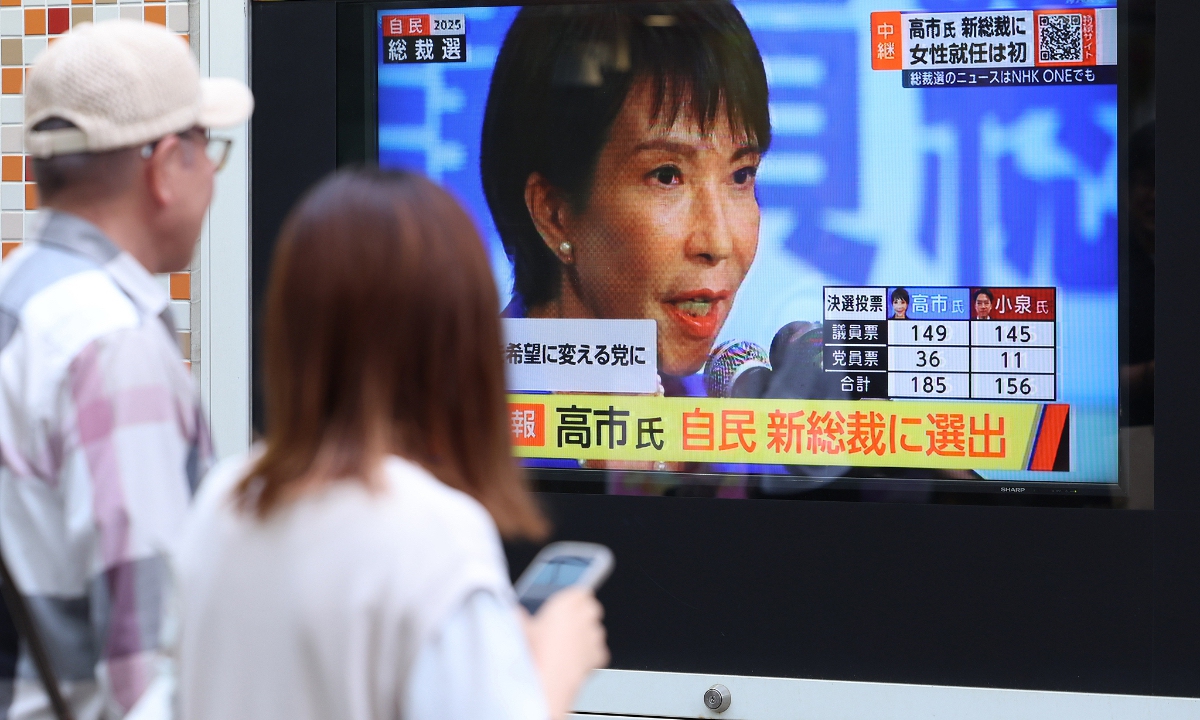Commentaries
Your Present Location: Teacher_Home> Ding Gang> CommentariesJapan’s real challenge isn’t China, but dependence on US
Japan’s real challenge isn’t China, but dependence on US
Source: Global Times
By Ding Gang
Update: Oct 22, 2025 08:30 PM

A news program on TV reports that Sanae Takaichi, Japan's former internal affairs minister, won the Liberal Democratic Party's presidential election by a runoff vote against Shinjiro Koizumi, the Minister of Agriculture, Forestry, and Fisheries, in Tokyo on October 4, 2025. Photo: CFP
With Sanae Takaichi's historic rise as Japan's first female prime minister, media headlines and social feeds have been filled with labels such as "hardliner," "hawk," and "tough on China."
However, anyone who knows the mood in Tokyo's political circles understands that this so-called toughness is really about Japan trying to assert itself, as the room for maneuver continues to shrink day by day.
The real dilemma for Japan's China policy isn't "hard" versus "conciliatory" - It's the simple reality that Japan's space to maneuver has narrowed to the point of vanishing, not so much because of what China does, but because Tokyo has made its own path narrower and narrower.
To put it bluntly, the central problem for Japanese diplomacy today is not that China is growing stronger, but that Japan has become so dependent on the US. You hear it in every Japanese government white paper and think tank report: The Japan-US alliance is the bedrock of Japan's security. Yet this same alliance is what has quietly eroded Japan's freedom of diplomatic action, making Japan a pawn of the US.
The numbers are more telling than the words. China is Japan's largest trading partner, with bilateral trade exceeding $300 billion in 2024. Japan's exports and investments in China are substantial; entire industries, such as automobiles, chemicals and electronics, depend heavily on the Chinese market. Japan's high-tech industry can't function without the critical rare earths from China. Furthermore, with Japan's rapidly aging population, sectors such as tourism and retail rely heavily on Chinese visitors. These are concrete, bottom-line interests - far beyond what any political slogan can erase.
On the other hand, Japan relies on the US not only for security but also for advanced technology and economic strategy. Take the upcoming October 27-29 visit by US President Donald Trump. Japanese media reported that he'll demand a follow-through on a $550 billion investment pledge, along with more pressure on tariffs and energy. However, you do the math, Tokyo has little room for negotiation. Can the new Japanese government really say no?
This "double squeeze" - caught between its reliance on China's economy and subordination to US demands - isn't a temporary headache. It has become Japan's structural predicament, with much of its China policy now a response to relentless US pressure. The US acts against China, Japan follows. Export controls, "Indo-Pacific Strategy," supply chain decoupling - Tokyo complies with Washington's pressure. Japan outwardly "follows its ally."
In reality, Japan continues to trade away its own strategic autonomy. The harder Tokyo suppresses engagement with China, the harsher Beijing's counters become. It is a cycle that leaves Japan increasingly exposed and isolated.
The question, then, isn't how high the cost of the US-Japan alliance will climb - It's how much longer Japan can bear it. Takaichi's political base - conservatives and coalition partner Japan Innovation Party - is precisely the groups most committed to "sticking with the US no matter what."
In the long run, this dependence on the US runs far deeper than the logic of an alliance. Since being remade under US occupation after World War II, Japan's institutions, security doctrine and even national identity have been tightly intertwined with the US. On the other hand, the Japanese public trusts and relies on the US, seeing closeness as safety. This limits Japanese leaders' independent policy options.
Moreover, this dependence on the US, coupled with the rise of China and East Asia's increasing importance as a significant engine of the global economy, places Japan in a profound structural bind.
The US will not tolerate its most prominent Asian ally showing any absolute independence in dealing with China. The intensifying competition between Washington and Beijing hasn't just forced Tokyo to take a side; it has locked Tokyo ever more tightly to decisions made elsewhere. Looking ahead, unless Japan reckons honestly with this reality, it won't matter much who sits in the prime minister's chair: Absolute diplomatic autonomy will remain a myth.
And that's why, for all the talk of a "strong Japan," as long as the country remains fundamentally dependent on Washington, it will never become a truly independent state with a standard foreign policy. This, too, explains why many of Japan's neighbors never see what Tokyo wants first, but rather what Washington will allow Tokyo to do, or prevent it from doing.
Key Words: China, Japan, U.S.























































































 京公网安备 11010802037854号
京公网安备 11010802037854号





